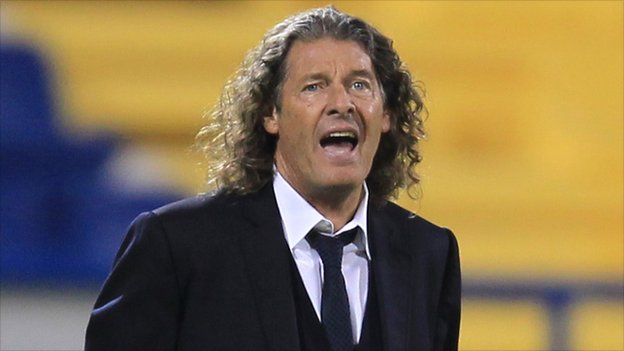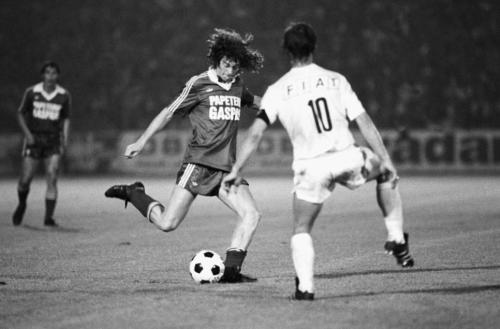

Bruno Metsu in his playing days at Valenciennes (1975-1979).
[article]Metsu’s honours
Al Ain
AFC Champions League: 2003
UAE Pro League: 2003, 2004
Al Gharafa
Qatar Stars League: 2005
Shaikh Jassem Cup: 2006
Crown Prince Cup: 2011
Emir Cup: 2011
UAE
Gulf Cup of Nations: 2007[/article]
[article=http://uk.eurosport.yahoo.com/news/football-former-senegal-coach-metsu-dies-aged-59-075653553--sow.html]Former Senegal coach Bruno Metsu, who led the African country to the World Cup quarter finals in 2002, has died aged 59, French media reported on Tuesday.
Local newspaper La Voix du Nord, sports daily L'Equipe and France Football magazine reported that Metsu, who quit his coaching job at Dubai club Al Wasl last year to fight stomach cancer, passed away overnight at his Dunkirk home in northern France.
The much-travelled Metsu, also known as "The White Sorcerer", also coached Guinea, Qatar, and several clubs in the Gulf region.
However, the highlight of his career came at the 2002 World Cup when Senegal beat holders France in the opening game and went on to reach the last eight. That year, Senegal also reached the African Nations Cup final.[/article]
[article=http://www.sport360.com/football/ex-uae-senegal-boss-bruno-metsu-dies-aged-59]Former UAE, Al Ain and Al Wasl boss Bruno Metsu has passed away at the age of 59 after a long battle with cancer.
News of Metsu's death comes almost a year to the day he was forced to stand down as Wasl boss after being diagnosed advanced cancer in his colon, liver and lungs.
In an interview with French daily L'Equipe back in July, the hugely popular coach, who guided the UAE to a first ever Gulf Cup success in 2007, spoke of "playing the match of his life".
Metsu also revealed that he was drawing strength from countryman Eric Abidal's own remarkable recovery from a life-threatening liver transplant as he bravely battled the terminal illness.
Aside from his success with the UAE, Metsu also guided Al Ain to AFC Champions League glory 10 years ago and in doing so became the first coach to taste continental success with a UAE club.
However, it was back in 2002 when the name of Bruno Metsu swept around the footballing world like wildfire after the Frenchman masterminded one of the biggest shocks in World Cup history.
France, defending champions and also Euro 2000 victors, were beaten by Metsu’s unfancied Senegal 1-0 in their opening match of the 2002 World Cup thanks to a goal from Papa Bouba Diop.
It was on the game's greatest stage that a relatively-unknown Metsu had given a first glimpse of the credentials that would soon make him revered in the UAE.
A charismatic figure with the flowing locks that were more rock star than football manager, Metsu exuded an aura that immediately stood out from his contemparies.
A league and AFC Champions League double with Al Ain in 2003 captured the hearts of fans in the Garden City, with many taken by his humility and attention to detail in his tactics and strategy.
Four years later he was the toast of the Emirates after guiding the UAE to their first major trophy with success at the Gulf Cup on home soil.
His former captain Mohammed Omar paid tribute to his qualities and remarked that he was “loved by the players whether they were on the field or in the stands”.
That sentiment was echoed by Senegalese striker El Hadji-Diouf, who came to the fore under Metsu's tutelage in 2002 leading to a big-money move to Liverpool.
“For us, Bruno was like the dad of the team,” said Diouf in an exclusive interview with Sport360° last year.
“He’s the guy who always looks after the players, wants them to do well and gives them a lot of confidence. If you manage people and don’t give them confidence I don’t think it works. He made it work.
“He gave confidence to the players and you saw that on the pitch with our team’s performances. "We did well in the World Cup because we had a good spirit and we wanted to win together. He always gave the players belief that we could beat anyone, not just me.
"He’s a winner. I know him very well like my dad and he is a passionate man. He knows only one thing. He used to say all the time that ‘only winning was beautiful’.
Following his success in the UAE, Metsu spent time in charge of the Qatari national team and one of the country's biggest clubs, Al Gharafa, before returning Al Wasl in the summer of 2012.
An encouraging start to life at the Zabeel was cruelly cut short by the diagnosis that would ultimately lead to his untimely death.
Bruno Mestu. Gone, but never will he be forgotten here in the United Arab Emirates.[/article]
Earlier in Jul 2013
[article=http://gulfnews.com/sport/football/bruno-metsu-playing-the-match-of-his-life-1.1215532]Former UAE national team coach Bruno Metsu has revealed he is “playing the match of his life” in his first interview since being diagnosed with terminal cancer nine months ago.
Metsu, 59, resigned as coach of Dubai club Al Wasl last October after being told the shattering news that he had advanced cancer in his colon, liver and lungs.
The UAE’s 2007 Gulf Cup-winning coach, who also lifted the 2003 Asian Champions League title with Al Ain, had only been with the Zabeel outfit for three months after succeeding Diego Maradona last summer.
Since then, the tactician most famous for leading Senegal to a shock 1-0 win over his native France in the opening match of the 2002 Fifa World Cup, has remained out of the spotlight. That was until an interview with French sports daily L’Equipe on Wednesday.
“They gave me three months [to live],” said Metsu, who has since returned to France with his wife and three young children.
“It was an enormous shock. I was with Viviane, my wife and we were crying as we left the hospital. You think about your kids and everyone around you.
“I started chemotherapy almost immediately and when I went to the hospital, I was in a wheelchair, I was so weak but there was no question of giving up.
“Often as a coach, you tell your players: ‘Today is the match of your life’. But no, it isn’t! Today, yes, I am playing the match of my life.
“I wanted to tell my story or rather my testimony. When I saw a programme on Eric Abidal, that gives strength and inspiration to others, that is a powerful thing,” he said, referring to the French defender who has recently come back from a life-threatening liver transplant due to cancer.
“When someone gives you three months, you fight to go further,” said Metsu, who has gained 2kgs in recent weeks after losing 17kgs since his diagnosis.
“You tell yourself: ‘You, you’re not going in three months and if you beat me, it won’t be easy.
“In February, we didn’t notice that I had pneumonia and I had chemo on top of it. I stayed 10 days between life and death. That was the most difficult fight that I have known. Ninety per cent of people don’t survive this situation, but I had an incredible desire to survive.
“I have learnt a lot about myself and family values. Today I can watch my children grow up and I have had nine months of happiness at their side and it’s so much better than football.
“These kind of challenges can also bring a lot too. You see things differently. You take on a completely new way of thinking and how to be strong, like Abidal.”
Of his latest prognosis, Metsu, said: “Currently, it is well stabilised in the liver and lung and my blood tests are better. On Monday, I had a scan and it’s going much better. The doctor was happy, and me even more.”[/article]

